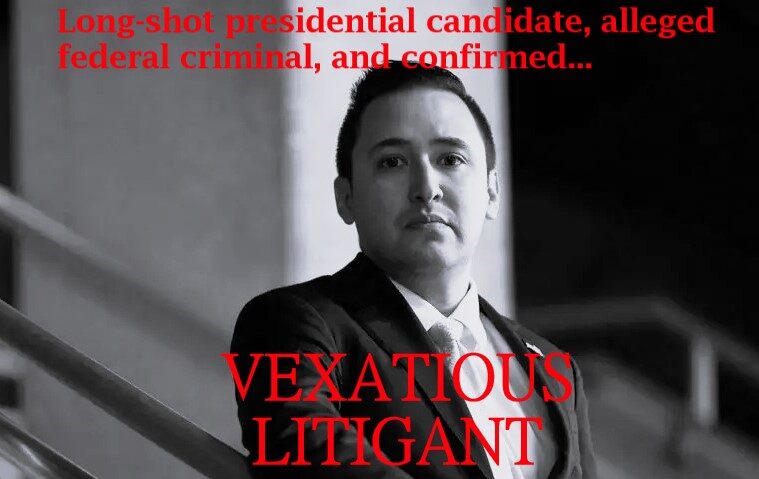Case Status: Victory in District Court
Castro v. Doe

The Center for Individual Rights is defending an anonymous Wikipedia editor’s free speech rights against a baseless $180 million defamation lawsuit brought by a Texas political figure. CIR is fighting to strengthen existing constitutional protections for anonymous commentary on such political figures and matters of public concern. Anonymous political speech is a core First Amendment right rooted in the American founding. That right is at risk with the threat of high stakes but ultimately meritless lawsuits by petty government officials and those who seek such power.
Defamation Suit to Suppress Critical Speech
CIR’s client regularly contributes articles to Wikipedia as a volunteer writer and editor under the username “Chetsford.” The larger community of Wikipedia editors has recognized the high quality of Chetsford’s contributions.
The suit against Chetsford was brought by a Texas-based political figure named John Anthony Castro, who is currently running for the Republican nomination for President. Castro’s suit alleges that Chetsford created a defamatory Wikipedia page about Castro. The article included information on Castro’s previous failed attempts to run for elected office in Texas including a 2020 run for one of Texas’s seats in the U.S. Senate, where he won 4.5% of the vote in the Republican primary. Following that defeat, Castro ran the next year for a seat in the House of Representatives for Texas’s sixth congressional district, winning 5.5% of the vote. The article also noted that Castro recently filed a lawsuit attempting to block Donald Trump’s eligibility to run for president again and information on other lawsuits Castro initiated.
On June 16, 2023, Castro filed a lawsuit against Chetsford and three other unnamed defendants, alleging that certain entries on the Wikipedia page were defamatory and, without any evidence, that the defendants worked together for financial and other reasons to injure him. According to the complaint, Chetsford’s Wikipedia article included three allegedly false and unflattering claims about Castro, for example, that Castro was a “‘sleazy’ tax attorney.”
As it turned out, though, the Wikipedia page didn’t identify Castro as a “sleazy tax attorney.” Rather, it noted that a tax professor at Texas Tech University School of Law gave Castro his “Norm Peterson” award (named after the accountant character on “Cheers”) for giving tax advice that is “so crazy it could only have come from Norm.” But even if the Wikipedia page had directly identified Castro as a sleazy tax attorney, the term “sleazy” is a classic statement of opinion that is not defamatory as a matter of law. Nor is any other part of the post defamatory.
Castro’s lawsuit seeks “not less than $180,000,000.00 for: (1) lost profits, (2) lost enterprise value, and (3) punitive damages” (grammar corrected). In order to carry his suit forward, Castro subpoenaed Wikimedia Foundation, Inc., demanding records that would establish Chetsford’s identity in order to subject him to this potentially crushing liability. That would weigh quite heavily on anyone even if the claims are frivolous. The First Amendment prohibits this type of litigation exposure for speech without an appropriate showing, which Castro has not met. CIR is representing Chetsford, and together with the Wikimedia Foundation, is seeking to quash the subpoena.
This isn’t the first time Castro has filed a high-dollar defamation suit to suppress criticism of him. The previous unsuccessful suits concerned Castro’s performance as a tax attorney or tax advisor. In one, Castro sought $1.45 million in compensatory and punitive damages against a former client who had complained to his coworkers about the quality of Castro’s services. In another, he sought nearly $250 million against a tax professional who had criticized Castro’s practice.
Stopping Abusive Lawsuits that Silence Political Speech
Castro’s complaint has all the hallmarks of a Strategic Lawsuit Against Public Participation (SLAPP). SLAPPs are meritless lawsuits that public figures use to suppress the publication of unflattering information about them. Castro is suing Chetsford regarding writings that are matters of public concern involving a political figure—a current candidate for President. Even assuming Castro’s allegations about Chetsford’s authorship are accurate, any statements about him and his public record are not actionable without proof of falsehood and actual malice.
More than thirty states have recognized that abusive SLAPPs threaten free speech and have responded to the problem by enacting anti-SLAPP laws. These laws give defendants the ability to dismiss meritless lawsuits early in litigation, but Castro’s suit in federal court is an improper attempt to circumvent these protections. As people increasingly use online platforms to discuss political issues, companies or public figures who wish to deter criticism have greater access than ever to federal courts if they can prove diversity of citizenship (suits between parties who are citizens of different states). Accordingly, even people who live in states with anti-SLAPP laws are vulnerable to abusive litigation attempting to silence them.
Preserving the right to anonymous speech online is a powerful defense against SLAPPs in federal court, where state anti-SLAPP laws may be of limited use in expediting the dismissal of frivolous lawsuits designed to silence the public. If an online writer remains anonymous, then there is no federal court jurisdiction to hear a case based on the diverse citizenship of the parties. Of course, if there is reasonable evidence that an anonymous writer truly defamed someone, a federal court can permit discovery of the writer’s identity—but federal courts properly require more than empty allegations devoid of proof before they will interfere with the rights of an anonymous author. CIR took up Chetsford’s defense in Castro v. Doe to protect anonymous speech online from SLAPPs in federal court.


